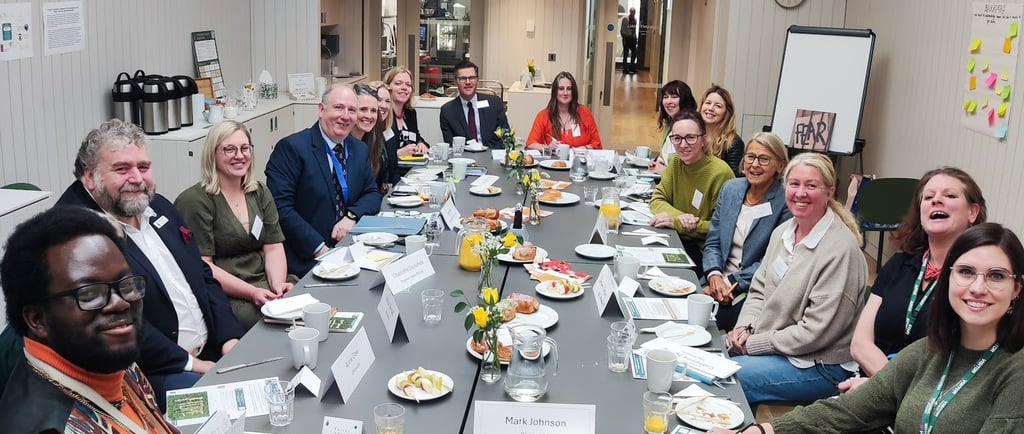Hearing the Young Unheard in Chipping Norton
Reflections from the High Sheriff’s Breakfast Conversation on Domestic Abuse and Young People
5/7/20253 min read


Yesterday, The Branch Trust in Chipping Norton hosted a powerful Breakfast Conversation convened by the High Sheriff of Oxfordshire. Part of a county-wide series under the banner Hearing the Young Unheard, the event brought together professionals from across education, policing, local government, health services, and the voluntary sector to explore one of the most urgent and complex challenges facing young people today: domestic abuse.
The room was filled with people who see first-hand the impact of trauma on children and families—those who support, protect, teach, and advocate for Oxfordshire’s youngest residents. But beyond titles and job roles, it was a space for truth-telling, listening, and imagining what we could do together to make change.
The Power of Convening
The High Sheriff opened the morning by reminding us that the ceremonial role may not carry legal authority, but it does carry the power to convene—and that can be transformative. This breakfast wasn’t about organisational flag-waving, but about dreaming together, exploring possibilities, and identifying actions we can each take to amplify the voices of children affected by abuse.
We were invited not only to reflect—but also to commit.
What We Heard
The conversation was framed by powerful, pre-recorded testimonies from young people. These included statements like:
"I get up every 15 minutes to check on my mum."
"I wanted to hurt myself so I wouldn’t have to see my dad."
"Professionals never listened to me."
These words hung in the air throughout the morning. They challenged us to acknowledge not just the trauma of domestic abuse—but the way systems can fail to hear and support children at their most vulnerable.
We heard that trauma doesn’t end when the abuse stops. Post-separation abuse is common, and its effects—on trust, confidence, education, relationships, and identity—can last a lifetime. Several participants described how services sometimes miss or unintentionally silence young people. And rurality adds another layer of complexity: transport poverty, isolation, and limited access to services are real barriers to support in this part of Oxfordshire.
Themes That Emerged
Five clear themes came to the fore:
Children are not just witnesses to domestic abuse—they are victims.
Their needs must be central in every response.Early intervention only works when it is truly early, accessible, and consistent.
The reduction in health visitor referrals was cited as a worrying trend.Building trust takes time—and time is often the very thing that services lack.
The value of long-term, relationship-based support was repeatedly emphasised.Education is prevention.
There was strong support for improving and expanding relationship and sex education (RSE) in schools. Campaigns calling for compulsory RSE to age 16 were shared and celebrated.Collaboration isn’t optional—it’s essential.
Participants highlighted the need for improved data sharing, clearer referral pathways, and a more joined-up response to safeguarding children.
What People Are Doing Next
At the end of the event, each participant was invited to share a pledge—something tangible they will do as a result of the morning.
These included:
Strengthening collaboration between schools and local charities.
Exploring how to share police and safeguarding data to support earlier intervention.
Enhancing domestic abuse training for professionals at the earliest stages of their careers.
Lobbying for improved national education standards on consent, coercion, and healthy relationships.
Providing free training on harmful practices like forced marriage and honour-based abuse.
Expanding group-based RSE workshops in schools.
Revisiting trauma-informed training across social work and youth justice services.
Improving continuity of support for young people through trusted relationships.
It was inspiring to see that no one left the room without a commitment to act.
Next Steps
The High Sheriff will reconvene participants in March 2026 to reflect on what progress has been made and what partnerships have flourished. Between now and then, participants will be sharing ideas, exchanging data, launching collaborations, and—most importantly—keeping young people’s voices at the heart of everything they do.
Final Reflections
This was not a morning of easy answers, but of courageous questions. It reminded us that systemic change starts in small rooms where people come together to listen, learn and commit.
It reminded us that we can only truly hear the young unheard if we first make the space to do so.
If you'd like to get involved in future Breakfast Conversations, please contact the Office of the High Sheriff of Oxfordshire.
Together, we can help make Oxfordshire a safer, more compassionate place for all our young people.
The Oxfordshire Shrievalty
Championing justice and community across Oxfordshire
© 2026. All rights reserved.
